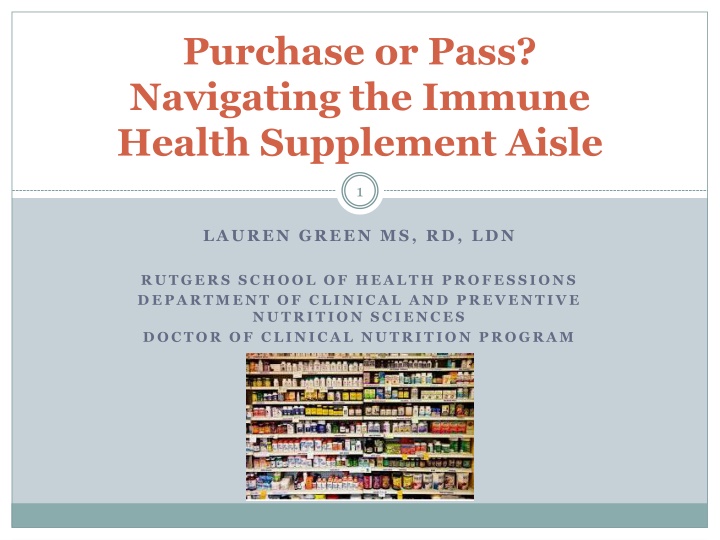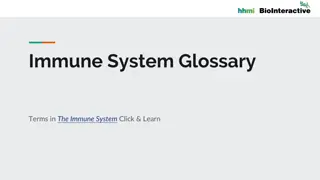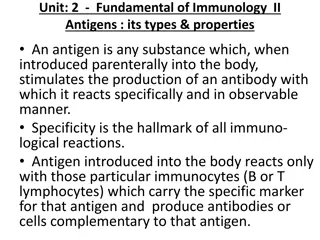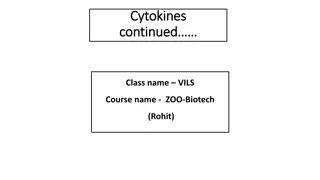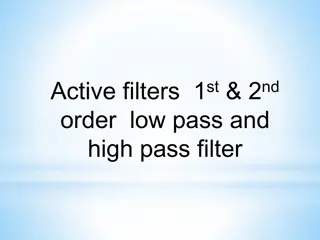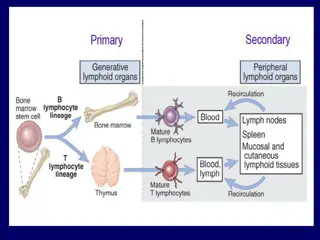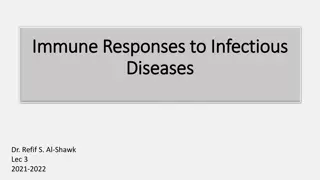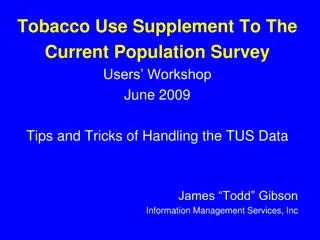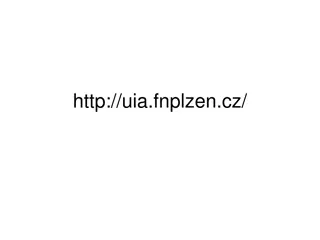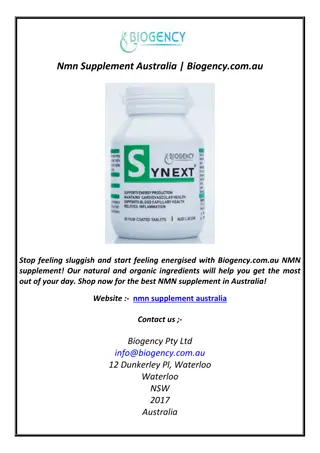Navigating the Immune Health Supplement Aisle: What to Purchase or Pass?
In this informative presentation, Lauren Green, MS, RD, LDN, explores the world of immune health supplements, discussing regulations, safety considerations, and different types of supplement claims. From understanding the definition of supplements to key factors in making purchasing decisions, this guide provides insights into emerging research, dietary tips, and more related to COVID-19 nutrition.
Download Presentation

Please find below an Image/Link to download the presentation.
The content on the website is provided AS IS for your information and personal use only. It may not be sold, licensed, or shared on other websites without obtaining consent from the author.If you encounter any issues during the download, it is possible that the publisher has removed the file from their server.
You are allowed to download the files provided on this website for personal or commercial use, subject to the condition that they are used lawfully. All files are the property of their respective owners.
The content on the website is provided AS IS for your information and personal use only. It may not be sold, licensed, or shared on other websites without obtaining consent from the author.
E N D
Presentation Transcript
Purchase or Pass? Navigating the Immune Health Supplement Aisle 1 LAUREN GREEN MS, RD, LDN RUTGERS SCHOOL OF HEALTH PROFESSIONS DEPARTMENT OF CLINICAL AND PREVENTIVE NUTRITION SCIENCES DOCTOR OF CLINICAL NUTRITION PROGRAM
Todays Food for Thought 2 Supplements What are they? How are they regulated? What claims can they make? Overall considerations when purchasing supplements Key immune supplements Some considerations for purchasing or passing Emerging research related to COVID-19 Other nutrients that seem to be popping up relative to COVID-19 Dietary tips to help food be thy medicine
Supplements Defined 3 As defined by Dietary Supplement Health and Education Act of 1994 (DSHEA)1,2: Intended to supplement the diet Contains one or more dietary ingredients such as1: Vitamins Minerals Amino acids, Protein Herbs or botanicals Others (Probiotic, Prebiotic, Enzyme) Taken by mouth Labeled as a dietary supplement
Purchase or Pass: Supplement Safety 4 Regulated by the FDA as foods1 Unlike drugs there is no pre-market surveillance Once marketed burden is on the FDA to prove there is a safety concern Ingredients: Generally Recognized as Safe (GRAS) Pre-DSHEA New dietary ingredients (NDI) must be reviewed and approved by FDA Manufacturers must monitor adverse events and report serious events to the FDA within 15 days Good Manufacturing Practices (GMPs) were established in 2007 for dietary supplements1: A set of requirements by which dietary supplements must be manufactured, prepared, and stored to ensure quality. Requires manufacturers to guarantee the identity, purity, strength, and composition of their dietary supplements.
Purchase or Pass: Supplement Claims 5 May be in 1 of 3 categories1: Health claim FDA approved Example: Adequate calcium and vitamin D throughout life, as part of a well-balanced diet, may reduce the risk of osteoporosis. Nutrient content claim FDA defined High in .., Low ., Rich in Structure/Function claim Developed by individual company Must be provided to the FDA within 30 days of putting them on pack CANNOT suggest a product is a treatment or cure for a specific disease, that it will alleviate the symptoms of a disease or that it will prevent a disease1,2
Purchase or Pass: Deliveries 6 Pills - Tablets, Capsules, Softgels Most common delivery May be hard to swallow for some Powder, Bar, Gummy Taste is a consideration Will contribute calories and macronutrients (including sugar) Limited stability for certain ingredients Dose is often limited (gummies) Others: Sprays, Dropper
All Supplements Arent Created Equal! 7 Consult with your healthcare provider before beginning or changing a supplement regimen Individual decision and approach Consider the source Large reputable company vs. local health foods store Be an informed consumer Ask questions! Do your research FDA 101: Dietary Supplements NIH Dietary Supplement General Information Claims too good to be true?? They probably are! NIH Supplement Ingredient Fact Sheets
Key Immune Supplements 8 Given the current environment, immune support supplements are increasingly popular but where to start?! A quick Google search for Immune Support Supplement yielded 128,000,000 results in just over second!
Vitamin C 9 Pass Purchase There are great food sources! Essential water soluble nutrient Can be degraded in foods through prolonged storage and cooking Antioxidant May be helpful during times of physical stress including infection3-5 Those who smoke require more Supplemental doses up to 1g have been documented to be well tolerated.3-4 Food and Serving Size6 Vitamin C (mg)6 Red or orange sweet peppers, cup 95 Orange, 1 medium 70 Fresh, Sliced Strawberries, cup 49 Baked Potato, 1 medium 17 Gastrointestinal disturbance at doses above tolerable upper intake level (UL) of 2g/day6 Has been used to combat pneumonia since the 1930s and may reduce incidence3-5
Vitamin D 10 Pass Purchase The Sunshine Vitamin Can be produced by the body There are many food sources including fortified options8 Milk, cheese, yogurt (dairy and plant based) 4,000 IU is the tolerable upper limit8 Can raise blood calcium if consumed in excess Limited sun exposure Diet limitations 400 IU/day for exclusively or partially breastfed infants7 Average intake from foods8: Men: 204-288 IU/day Women: 144 276 IU/day Protective effects of vitamin D have been identified in acute respiratory infections among those 0-954,9
Zinc 11 Pass Purchase Essential nutrient No meta-analyses or Cochrane reviews available Recommendations for Adults10: Men: 11mg Women: 8mg* Can be sufficiently obtained from the diet10: Oysters Beef Chicken, Dark Meat Pumpkin seeds Diet limitations Vegetarians/Vegans Required for approximately 100 enzymes! Necessary for the functioning of the immune system3 Inadequate zinc impairs immune function3 *Recommendations vary for pregnancy and breastfeeding.
Probiotics 12 Pass Purchase Diet limited in yogurt and other fermented foods Developing science Two most common: Lactobacillus and Bifidobacterium Efficacious dose Consistently many probiotics are transient Live probiotics which are labeled as at time of manufacturer The gut plays a large role in immune functioning. Consider prebiotics too (or more sauerkraut!)!
Herbals Elderberry & Echinacea 13 Pass Purchase Long history of use Designed by nature Potentially higher risk of allergic reactions compared to other supplements Generally recognized as safe (GRAS) Whole herbs, extracts, juices Different species Ex. Echinacea purpurea or Echinacea angustifolio No research available linking elderberry and echinacea to COVID-19 support.
Other Emerging Nutrients Related to COVID-19 14 Additional observational research suggests: Vitamin K Status related to prognosis and disease severity11 Selenium Proposed link between selenium status and cure rate12 Omega 3s Inflammation mitigation13 More research is needed!
Let Food Be Thy Medicine 15 Take a diet first approach and supplement where needed! Eat a variety of foods Make your plate fruits and veggies Focus on whole fruits Vary veggies Make your grains whole grains Choose My Plate There s an app now as well!
References 16 Dietary Supplements. National Institutes of Health. Available at: https://ods.od.nih.gov/factsheets/DietarySupplements-HealthProfessional/#h7. Accessed on May 15, 2020. FDA 101: Dietary Supplements. U.S. Food and Drug Administration. Available at: https://www.fda.gov/consumers/consumer-updates/fda-101-dietary-supplements. Accessed on May 15, 2020. Hemila H, Chalker E. Vitamin C for preventing and treating the common cold. Cochrane Database of Systematic Reviews 2013, Issue 1. Derbyshire E, Delange J. COVID-19: is there a role for immunonutrition, particularly in the over 65s?. J BMJNPH Epub ahead of print: May 17, 2020. Jacob RA, Sotoudeh G. Vitamin C function and status in chronic disease. Nutr Clin Care 2002;5:66-74. Vitamin C. National Institutes of Health Office of Dietary Supplements. Available at: https://ods.od.nih.gov/factsheets/VitaminC-HealthProfessional/. Accessed May 18, 2020. Armstrong C. AAP Doubles Recommended Vitamin D Intake in Children. Pediatrics. 2008;122;1142. Vitamin D. National Institutes of Health Office of Dietary Supplements. Available at: https://ods.od.nih.gov/factsheets/VitaminD-HealthProfessional/ . Accessed on May 15, 2020. Martineau AR, Joliffe DA, Hooper RL, et al. Vitamin D supplementation to prevent cute respiratory tract infections: systematic review and meta-analysis of individual participant data. BMJ 2017; 356. Zinc. National Institutes of Health Office of Dietary Supplements. Available at: https://ods.od.nih.gov/factsheets/Zinc-HealthProfessional/. Accessed on May 15, 2020. Dofferhoff A.S, Piscaer I, Schurgers LJ, Walk J, van den Ouweland JM, Hackeng TM, Lux P, Maassen C, Karssemeijger EG, Wouters EF, Janssen R Reduced Vitamin K Status as a Potentially Modifiable Prognostic Risk Factor in COVID-19. Preprints 2020. Zhang J, Taylor EW, Bennett K, Saad R, Rayman M. Association between regional selenium status and reported outcome of COVID-10 cases in China. The American Journal of Clinical Nutrition. Flass T. Diet and Your Immune System: A COVID-19 Related Update. Available at: https://www.krh.org/news/diet-and-your-immune-system-a-covid-19-related-update/. Accessed on 5- 18-2020. 1. 2. 3. 4. 5. 6. 7. 8. 9. 10. 11. 12. 13.
